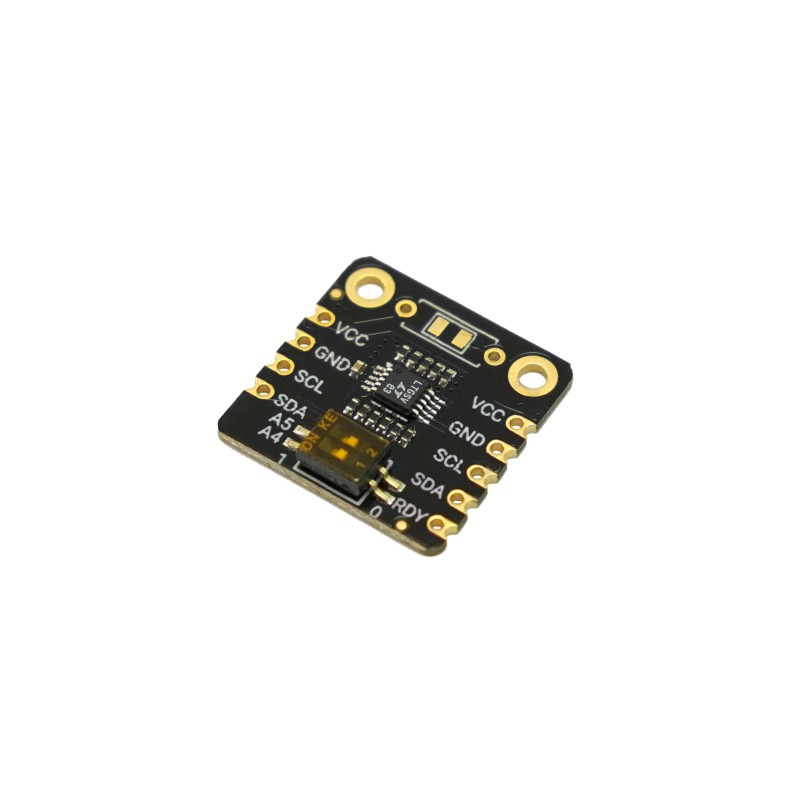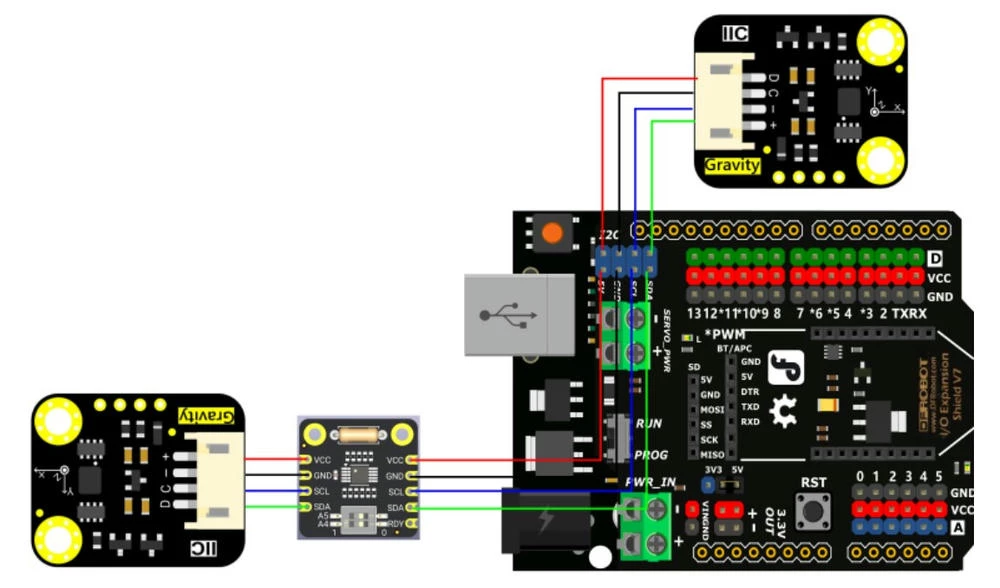





zł17.72 tax excl.
Compact module that allows easy changing of I2C sensor addresses, allowing coexistence of multiple devices with the same address on one bus. With DIP switches and optional soldering resistors, users can easily configure sensor addresses without having to modify the code or use external components. DFRobot DFR1185
I2C Address Shifter is a compact module designed to simplify the process of changing I2C sensor addresses in a development system. With this module, developers can easily modify sensor addresses without needing complex software interventions or code modifications. By placing the module between the development board and the I2C sensor, the sensor's address can be changed via the module, allowing multiple devices with the same address to coexist on a single I2C bus. This solution ensures easy integration and avoids synchronization issues that may arise with traditional I2C multiplexers. The module operates within a voltage range of 2.25 V to 5.5 V and consumes a minimal current of only 2 mA at 3.3 V, making it suitable for systems with different voltage requirements.

The converter supports address configuration using DIP switches and optional soldering of resistors. Users can easily select one of the four available new addresses, and after additional soldering, extend the address pool by at least 20 more addresses. The module is very easy to integrate, just connect it to the I2C system without needing to make changes in the software or use external components like multiplexers.
Manufacturer BTC Korporacja sp. z o. o. Lwowska 5 05-120 Legionowo Poland sprzedaz@kamami.pl 22 767 36 20
Responsible person BTC Korporacja sp. z o. o. Lwowska 5 05-120 Legionowo Poland sprzedaz@kamami.pl 22 767 36 20
No product available!
A set of basic electronic components complete with a contact plate, connecting cables and a DFRduino UNO R3 board. The attached cards with connection diagrams help create on the basis of a set of 15 interesting projects. DFRobot DFR0100
No product available!
DFRduino Nano V4.0 is a base plate compatible with Arduino Nano. The board has an ATmega 328-20AU microcontroller. The user has 14 GPIO ports (inputs / outputs), of which 6 can generate PWM signal. DFRobot DFR0010
8-channel IO expander with 6 analog inputs with 10-bit resolution. Communicates via USB interface. It has compact dimensions, making it suitable for small devices. Numato Lab GP80002-B
No product available!
16-channel PoE GPI/GPO module enabling connection of a PC to other electronic circuits via a network. It does not need a separate cable for power and data transmission. It can be controlled via a simple web interface or Telnet. Numato Lab NLGP1001-A
No product available!
A versatile expander supported by the I2C interface, which significantly expands the capabilities of microcontrollers and microcomputers. It is based on the ATSAMD09 microcontroller and comes with default software that can be modified to suit the needs of the project. Adafruit 3657
Module with three voltage analog outputs ranging from 0 to 10 V. It communicates via the RS485 interface and supports the Modbus RTU protocol. The board is enclosed in an industrial housing. Wellpro WP3079ADAM
8-channel module with digital inputs/outputs with an operating voltage range from 5 to 36 V. It communicates via the RS485 interface and supports communication within the Modbus RTU protocol. The board is enclosed in a housing that can be mounted on an industrial rail. Waveshare Modbus RTU IO 8CH
8-channel module with voltage analog inputs ranging from 0 to 10 V. After reconfiguration, it enables measurement of voltage in the range from 2 to 10 V or current in the range from 0 to 20 mA or 4 to 20 mA. It communicates via the RS485 interface and supports the Modbus RTU protocol. The board is enclosed in a housing that can be mounted on an industrial rail. Waveshare Modbus RTU Analog Input 8CH (B)
No product available!
KAmod Multiplexer features the CD4051 chip, which is an analog 8-channel multiplexer/demultiplexer. The chip can handle analog signals with an amplitude of up to 20 VPP and provides low on-state resistance. The active channel is selected through a sequence of states on three digital inputs
KAmod I2C Hub4 enables splitting the I2C bus into four independent outputs with a voltage level translation function, eliminating address conflicts and increasing connection flexibility. The module is intended for projects with multiple I2C devices requiring separation or diverse supply voltages.
KAmod I2C Hub8 enables splitting the I2C bus into eight independent channels with a voltage translation function, which allows effective integration of multiple devices with repeating addresses. The module is recommended for advanced microprocessor projects with bus separation requirements and diverse voltage levels.
KAmod I2C-Mini Out8 enables easy expansion of microprocessor systems with eight switching outputs for voltages and currents typical of low-voltage load control. Compatibility with the I2C bus and the ability to connect up to 8 modules in a single network make it an ideal solution for automation systems, lighting and power control, and other applications requiring flexible control of multiple circuits.
The KAmod I2C-IOexp16 module is an extension equipped with 16 programmable digital lines (inputs or outputs), based on the MCP23017 system and controlled via the I2C bus with the possibility of connecting up to 8 modules thanks to addressing. The module works with a voltage from 2 to 5 V, has an interrupt output and allows for a current flow of up to 20 mA on each line
Compact module that allows easy changing of I2C sensor addresses, allowing coexistence of multiple devices with the same address on one bus. With DIP switches and optional soldering resistors, users can easily configure sensor addresses without having to modify the code or use external components. DFRobot DFR1185
I2C bus splitter enabling connection of multiple peripheral modules to a single I2C interface, equipped with Qwire connectors compatible with Qwiic and STEMMA QT, a KAmod I2C connector, and goldpin headers. Kamami KAmod I2C Hub Qwire
8-channel analog acquisition module with default current measurement mode (0–20 mA), designed for industrial applications requiring stable and precise data acquisition. Compatible with current sensors, it supports RS485 communication and the Modbus RTU standard, allowing easy integration with SCADA systems and PLC controllers. Galvanic isolation and noise immunity make it suitable for environments with high EMC requirements. Ideal for industrial process monitoring, environmental parameter measurement, and building automation.
8-channel solenoid driver controlled via I2C. Compatible with 3V/5V logic, features STEMMA QT / Qwiic connectors. Adafruit 6318
DFRobot DFR1193 module with the LTC4316 chip enables the simultaneous use of multiple identical I2C sensors without address conflicts. It supports quick configuration via DIP switches or resistors, offering a flexible and reliable solution for IoT, robotics, and automation projects.

Compact module that allows easy changing of I2C sensor addresses, allowing coexistence of multiple devices with the same address on one bus. With DIP switches and optional soldering resistors, users can easily configure sensor addresses without having to modify the code or use external components. DFRobot DFR1185
